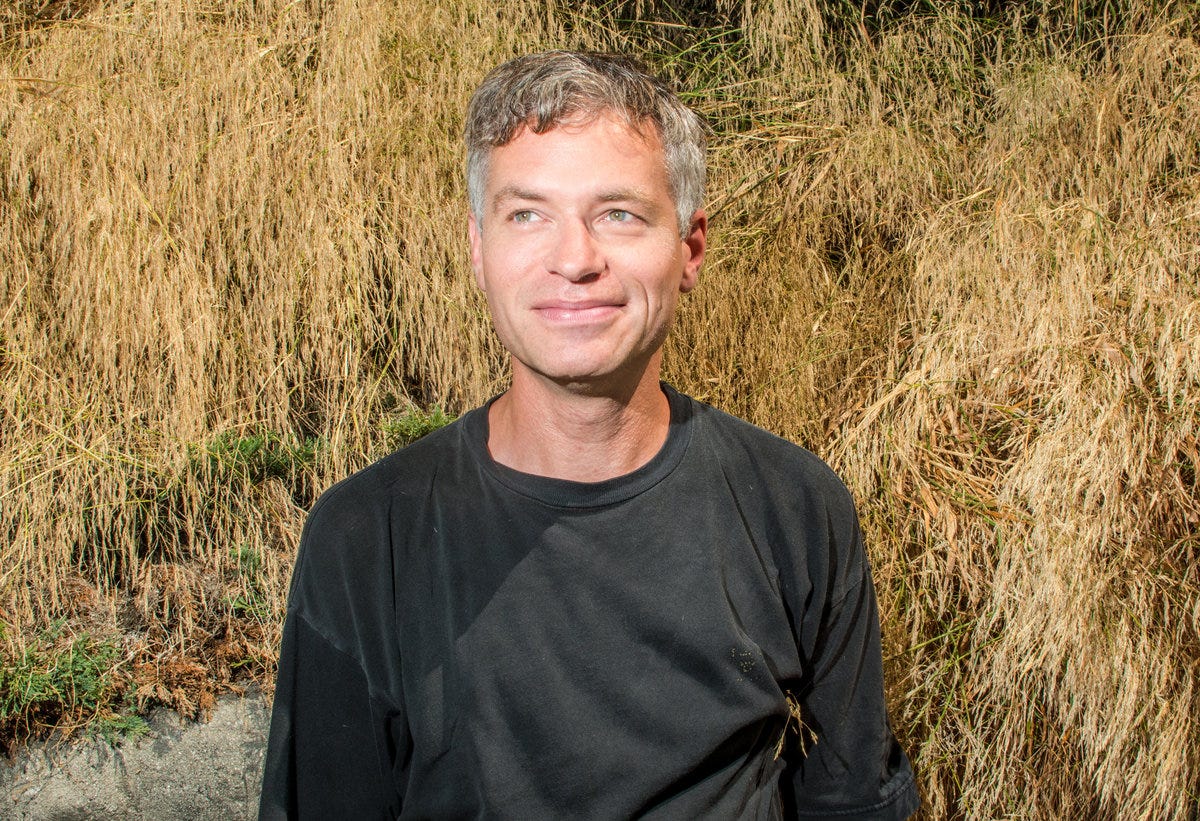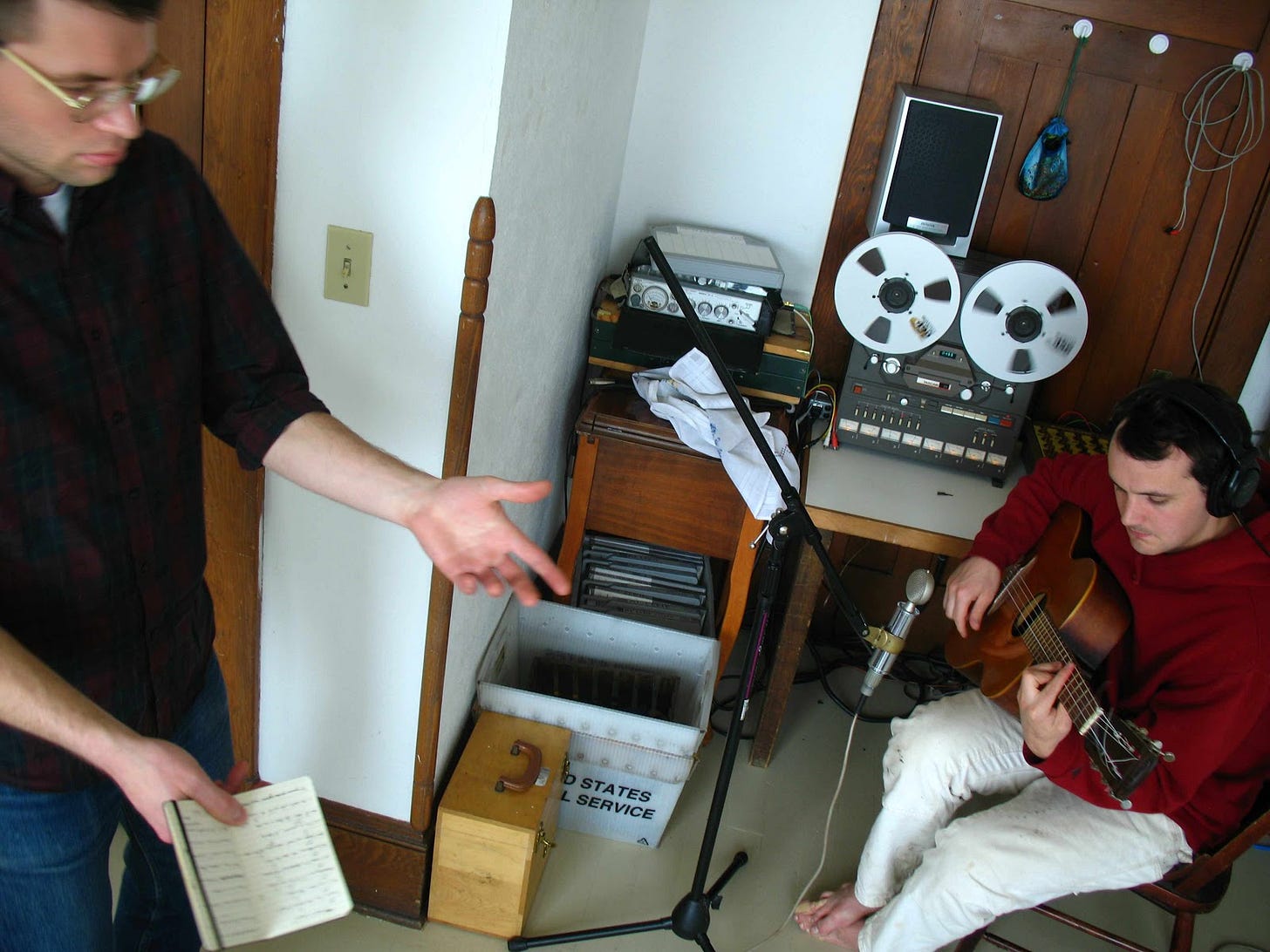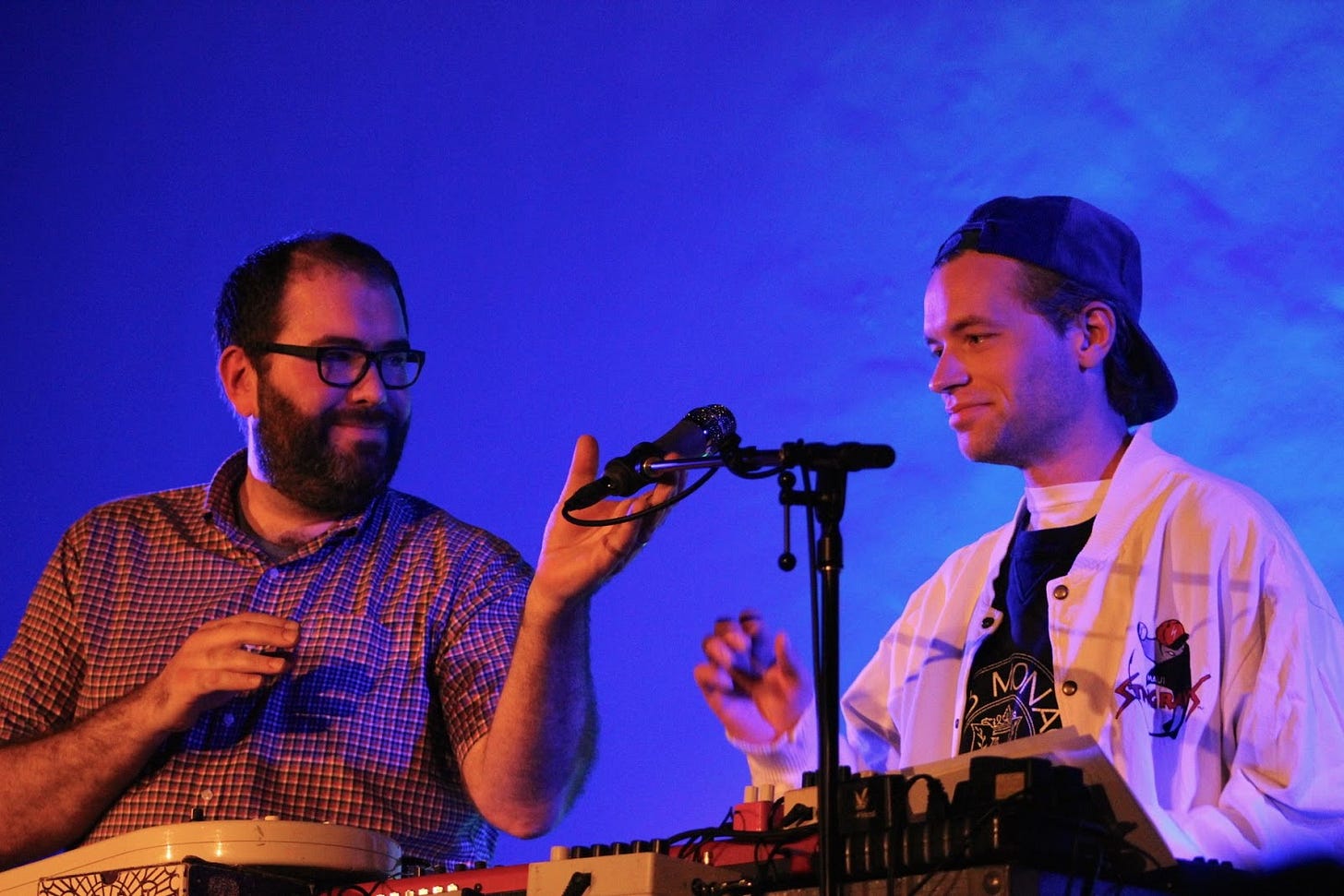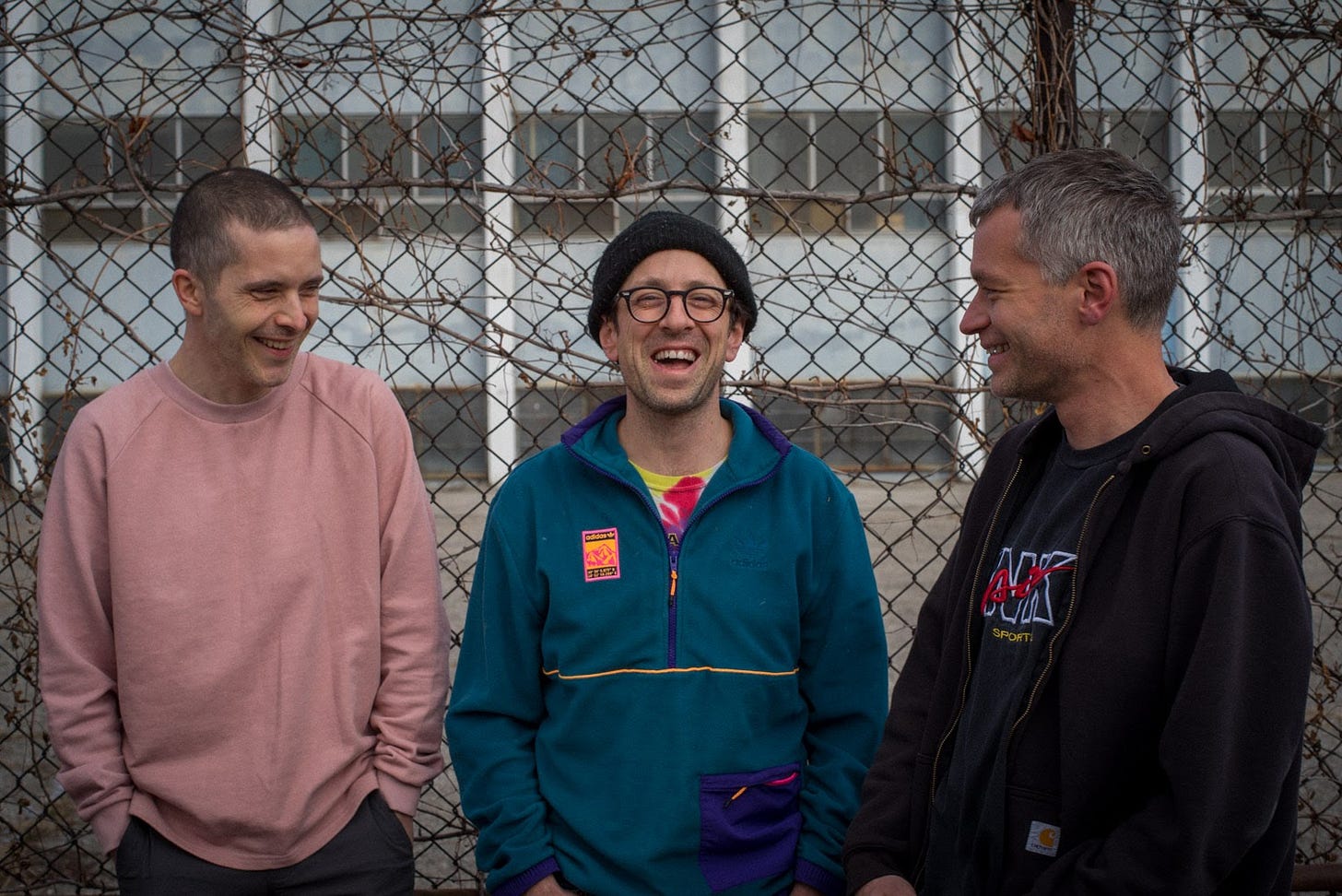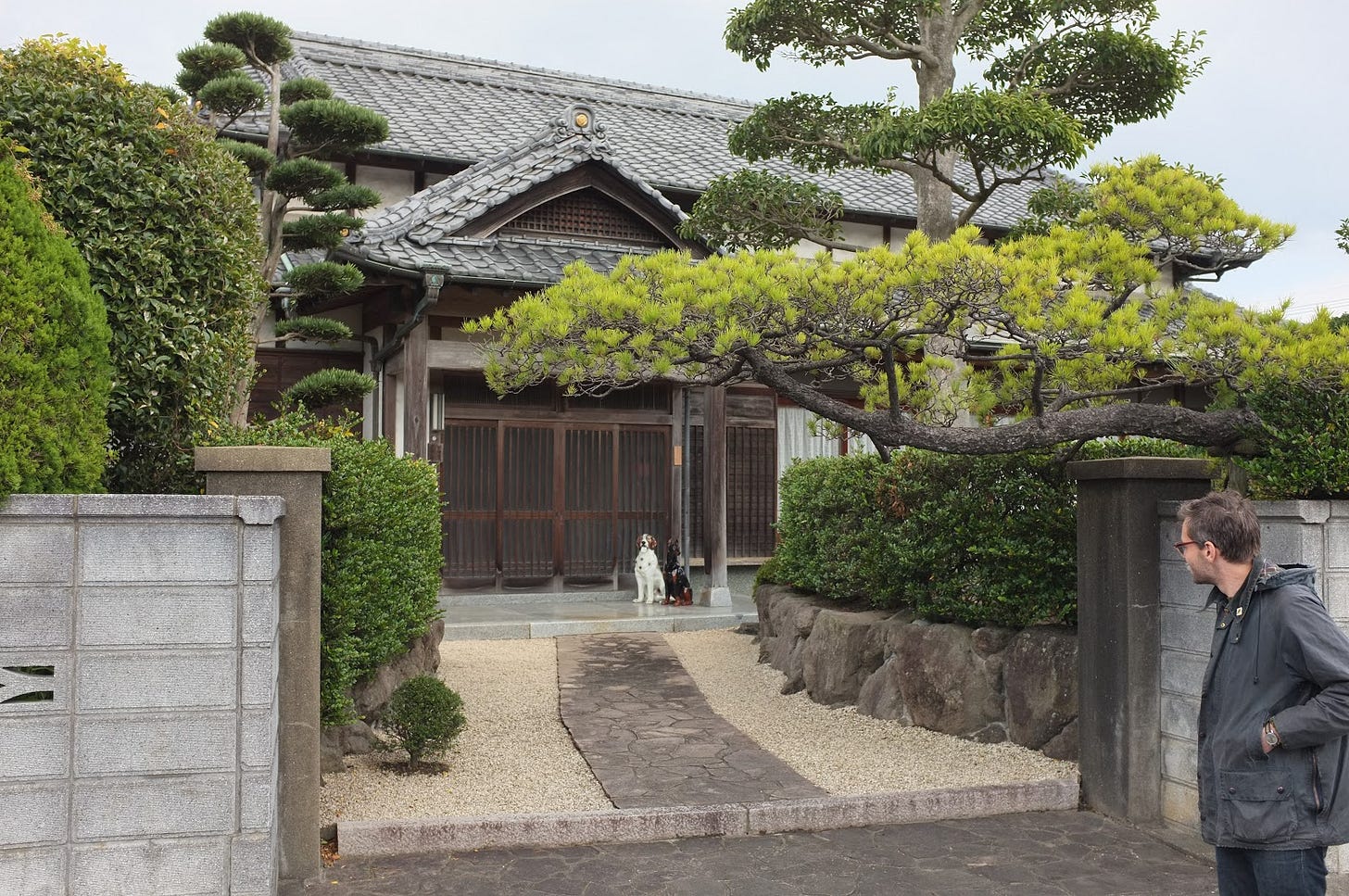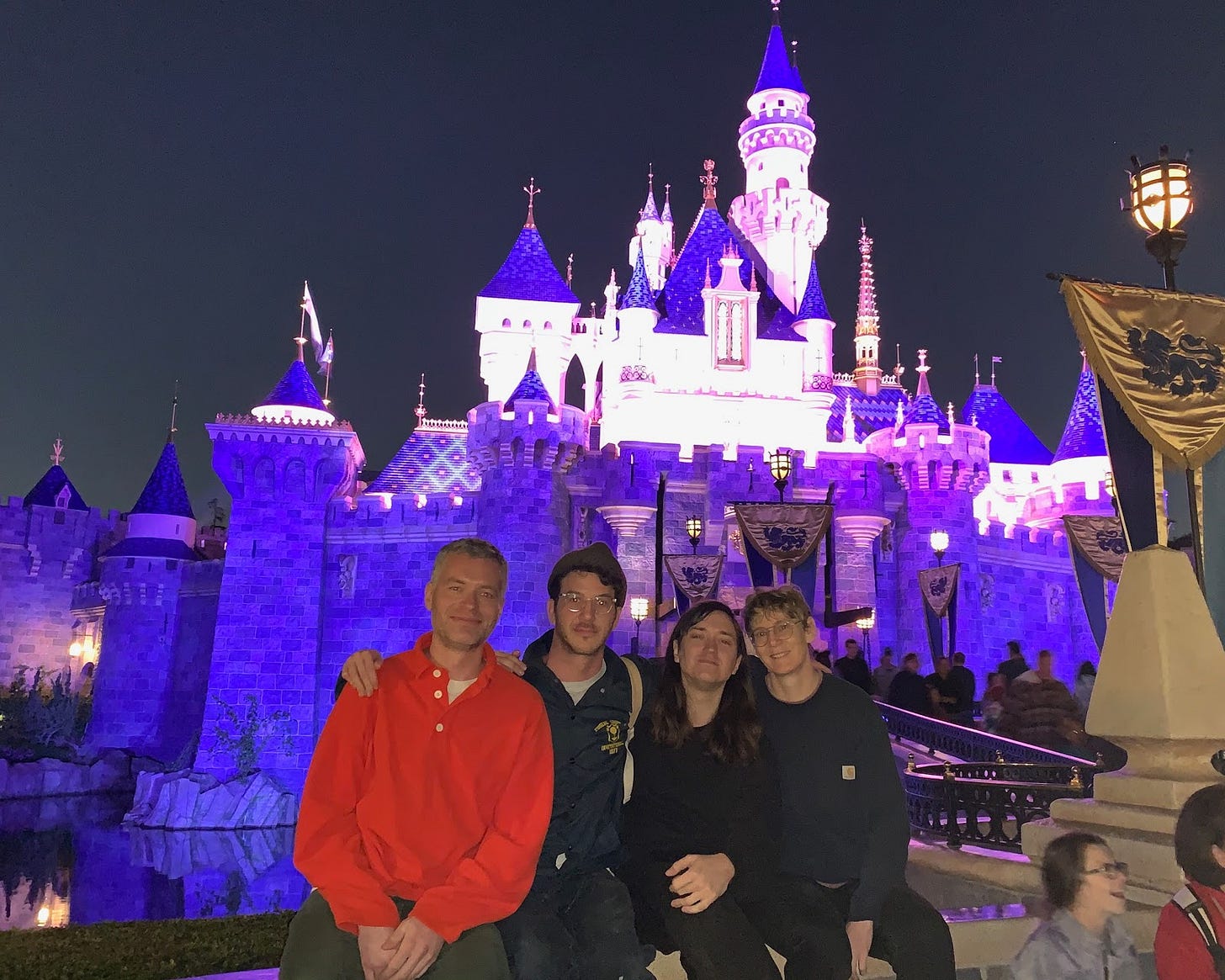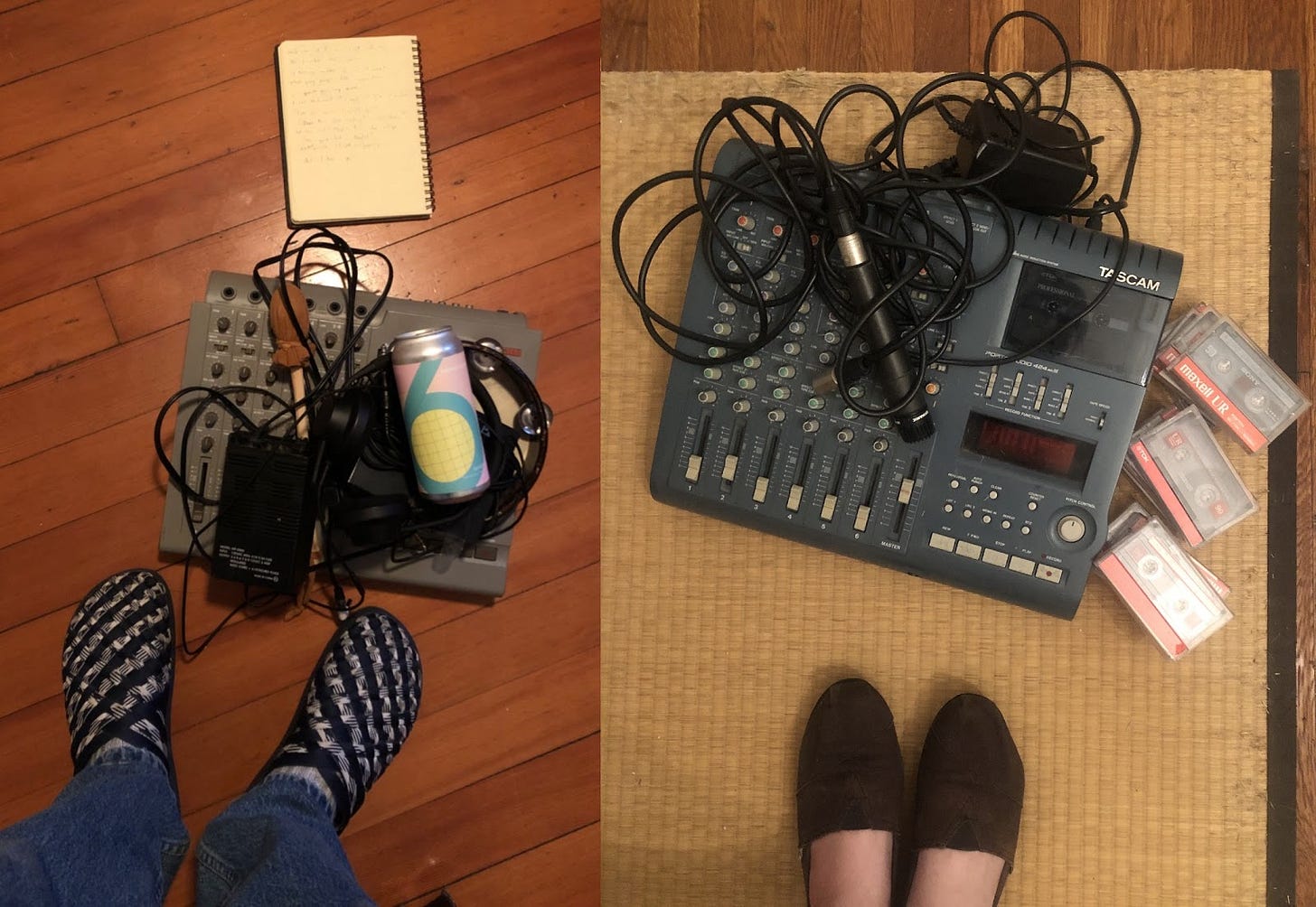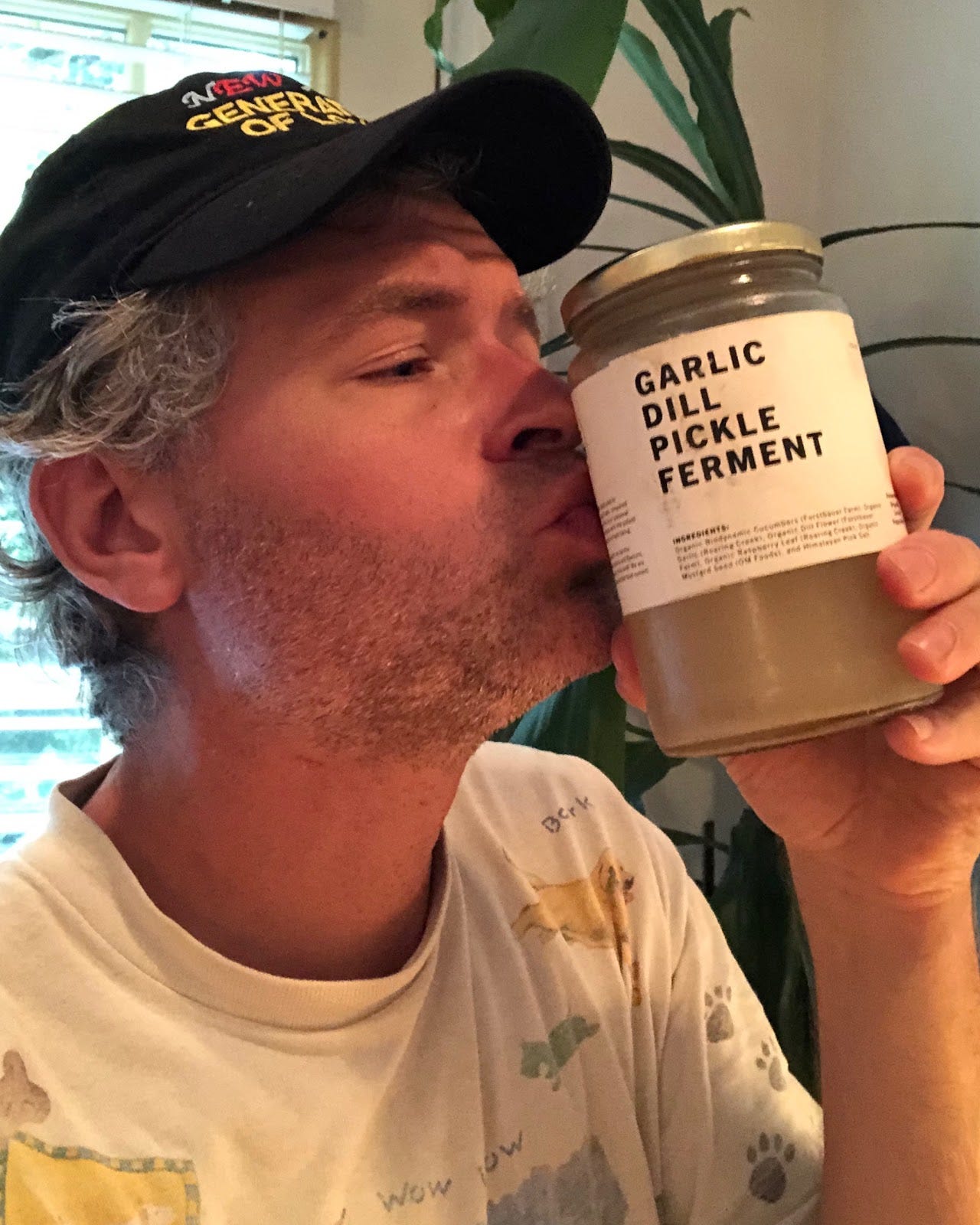Welcome to Tune Glue, a newsletter that’s run in conjunction with Tone Glow. While the latter is dedicated to presenting interviews and reviews related to experimental music, Tune Glue is a space for interviews with artists of any kind. These interviews could be with video game designers, perfumers, or musicians who aren’t aligned with what Tone Glow typically covers. Thanks for reading.
Nicholas Krgovich
Nicholas Krgovich is a Canadian musician based in Vancouver, BC. For nearly 20 years, Krgovich has charted the expansive contours of pop songwriting, from the playful 60's doo-wop of Gigi to the intimate chamber arrangements of P:ANO and No Kids. Under his own name, his releases have ranged from soaring studio ambitions to sparse bedroom affairs, but always with a playful melodic sensibility distinctly his own. On Philadelphia, conceived in partnership with Joseph Shabason and Chris Harris, his unique vocal presence wraps around his collaborators' gentle guitar tones and soft electronic textures as delicately as a chiffon ribbon around a thoughtfully chosen gift. Krgovich spoke with Emily Wirthlin on the phone on September 6th, 2020 about songcraft, friendship, and unconventional uses for pickle juice.
Emily Wirthlin: Hey! How are you, Nick?
Nicholas Krgovich: I’m well! How are you?
I’m doing good! I’ve been listening to “Philadelphia” [from upcoming album Philadelphia, by Shabason, Krgovich & Harris] to keep my nerves down (laughter). I’m not a music press person at all, just a big fan.
Oh really? What do you normally do?
I’m a neuroscientist! I study how speech and language work in the brain.
Whoa. I love that!
Would you mind if I record our conversation?
Not at all.
Great. I don’t have that Truman Capote’s perfect recall down quite yet so... (laughs).
And I’m a babbler too so it’s often hard to form the big blobs that I spit out into coherent sentences sometimes. I’ll do my best though!
That’s great. Well I have some questions, but if we just get to freewheeling that’s perfectly fine.
Cool!
So I guess to start out, one thing I'm always really interested in when I’m getting to know someone new is this idea of ‘place,’ both in terms of how it shapes us as people, with growing up, as well as our creative sensibilities. In the past you've mentioned the importance of place in your writing. So with that in mind, where are you right now?
I’m standing outside of the house where I live, and I just got back from a run—that’s in East Vancouver, British Columbia, Canada—where are you?
I’m in Pittsburgh right now, right near work at Carnegie Mellon.
Awesome. I haven’t been there in a few years, but I really like it.
It’s growing on me! I’m definitely a West Coaster at heart, born in the Bay Area then grew up in Nevada.
Oh wow, okay cool. I watched My So-Called Life a lot as a kid, and that was set in Pittsburgh, which is always such a weird city for a primetime TV show, I think.
We had Mr. Rogers here, too.
Oh really?! Oh yeah!
Yeah! Fred Rogers was from here, Andy Warhol...
Oh my god. Yeah, that’s cool (laughs). I think there’s a vibe there! But yeah, I live in Vancouver—born a 20 minute drive east—so I’ve always kinda been here. This is my land.
So there’s no way to have an interview with Nick Krgovich without mentioning LA. What was it about growing up in the Pacific Northwest and all this natural beauty that created this idea of an “LA” in your mind? How did you get there from Vancouver?
I think it’s as simple as always erring on the side of romanticizing things, even when I was a small kid. We’d go down to Disneyland when I was like 6, and then again when I was maybe 10, and at 14… and we’d just take family trips and go to California. I think I was just struck by simple things, like the quality of light. I think I cared enough about things like music and movies and pop culture enough to be like “this is where it all happens!” or whatever (laughter). So that kind of tickled me, too, the excitement of that, because especially when I was younger, I always wanted to be involved in making things that people paid attention to on a large scale. That obviously waned as I got older. But I think maybe that was it, just the ‘vibration.’
So coming back to Vancouver, you've spoken and sung in interviews and songs about how ideas work themselves out for you while running, through parks and woods. Did you spend much time outdoors growing up in BC?
I guess, but I never really felt— I literally just got back from a run too, I’m still kind of like dripping a little bit (laughter). I sweat so much it’s disgusting! Especially this time of year, I look like I just walked out of a lake with all my clothes on, actually. But I don’t think I was necessarily outdoorsy, but I think, again, I was very romantic about, like, “oh, the rain!” or a Twin Peaks-y, overcast, Pacific Northwest day. Those things just made me feel a certain way. But I was never like, really into mountain biking or something.
Right, right. And of course later that would seep into some of the collaborations you did with Phil [Elverum] in Mount Eerie, the Twin Peaks-inspired songs that you helped write.
Definitely, yep!
When I first saw you play, as No Kids, in 2009 you were opening for Phil during that really black metal-indebted Wind’s Poem period.
That was so fun.
Oh my god, it was incredible! Each of you playing on each other's sets, with his amazing drumming for No Kids, and your keyboards for Mount Eerie. And I'd never heard your music before, but I was just completely blown away. I had the refrain from “At the Grove” caught in my head for months like this unscratchable itch until the Judy at the Grove EP finally came out.
Wow!
So I’m curious, how was that experience? How was that tour, with the contrast between your sophistipop and his black metal thing he was doing at the time?
Yeah! Well, I guess it was significant in that we kind of did it for a number of years. Like, I think ’09 through 2011, 2012 we were off-and-on touring together a lot. And we’re all such good friends that it just felt, like, deeply unprofessional, in the best way. You know what I mean? It just felt like we were constantly on this fun road trip where we would play music. And I think both Phil and I and most of the people in the band… we like the idea of genre but we’re not too hung up on the importance of it, really. So I think we thought it was kind of fun and absurd to smash those two different kinds of musical components together.
Definitely a playful approach as opposed to any kind of “true cult” whatever.
Yea, and I was very mellow about it until there was one show that was booked with that Olympia band, Wolves in the Throne Room. And so that was a “Mount Eerie, Wolves in the Throne Room, Nicholas Krgovich” show, in North Carolina or something, and the stage was all set and decorated with, like, skulls and incense. It was very serious! And I almost forfeited the game, but then I ended up hopping up there and just doing my thing. And it was interesting but it was scary for me (laughs). ’Cause I feel like Wolves in the Throne Room fans have a lot less… I guess I can’t even speak to that really, but I feel like there’s a sense of humor below everything Phil does, to a degree. Well, at least back then. Maybe even still? I don’t know (laughs). There’s a sense of… actually, I don’t know (laughter).
When I talked to him after that set he had incredible things to say about your music. And it makes me wonder a bit how much your respective sounds, as different as they are, might have crept into each other’s writing, beyond you co-writing for him and him later recording On Cahuenga. On your last couple albums—I don’t know if I’m reaching here—including the recent collaboration, there are these references to “the Moon” that are very Mount Eerie-esque, in a way. Do you think there’s any truth to that?
Probably, but I think it’s just part of the unconscious swirl of soaking in the people around you that you’re inspired by. But I don’t think it’s necessarily some sort of conscious thing. I think about a lot of my friends’ music when I’m making my own, and I’ve heard from them that sometimes they do the same thing. I think it’s just part of the wheel.
So a lot of years went by between writing those songs and those concerts and then eventually this explosive trilogy of albums coming out, from the transcendent sophistipop color of On Sunset to this bare-bones intimacy on On Cahuenga, to then the demixed and remixed version on The Hills, fully seeing this idea through to the end. But leading up to that there was this really spare album of classic torch ballads, Who Cares? I guess there are a couple ways to interpret what you meant in putting that album out first, with all the frustrations there, but I’m curious how you view those songs of love and loss now, in light of this first real heartbreak that you’ve talked about as having inspired “Ouch”?
Right, well, there’s a lot in those, in that (laughs).
(laughter) right, I probably should have broken that up a bit!
That’s totally cool! I’m also just so tickled that you’re familiar with all of this stuff. It’s nice; I appreciate it.
I was trying not to show my hand but I’m probably in the top five Nick Krgovich fans in the world? I feel comfortable saying that (laughter).
Ah, that’s so nice! I love that. Well, I guess when you saw No Kids and Mount Eerie in ’09 I’d already started working on what was On Sunset, probably around the same time. And that didn’t really see the light of day until 2014. I wrestled with it a lot. I had this wild ambition that I thought was kind of absurd, like I was trying to make Thriller. Trying to do something the best that I could do but with none of the resources and… talent (laughter) that you need to pull something like that off. It felt like really staring down my limitations as an artist and a human at that time. And that’s so frustrating, when you think or wish that you were somewhere else, potentially, and you’re trying to make a thing and you realize you’re not. But at the same time, what did end up coming out, the album itself, it’s still kind of a unique, interesting thing that I’m proud of, in a way.
There’s a very similar process in science where you dream up these experiments or these things you want to say and work for years at it and eventually you realize that the right time for the paper to come out is when you’re completely sick of it. And it might not necessarily be what you wanted it to be at the time, but then looking back on it years later, sometimes you’re like, “Wow, I really did that!”
Yeah! Yeah, I feel similarly with On Sunset. That’s good to hear that that happens in other realms, too.
I think it’s a very universal, human thing.
And I guess when you’re working on a thing like that you get completely lost in it, because you’re working and chipping away for so long that to retain any sort of perspective on what’s going on can be hard. And that seeps out to your collaborators or close friends. I remember working on it with [producer and mixer] John Collins, and even [recording engineer] Colin Stewart, everyone, just got sucked into my black hole (laughter). And they tried to entertain all my ideas and keep things moving along in a way that was really interesting, though ultimately who knows if it was really worthwhile.
I like to swing between opposites when working on projects. Who Cares? was actually written and recorded after On Sunset, but came out before it. And Who Cares? was clearly the flip of On Sunset. That’s a ‘Saturn returns’-y album, I would say. That was my… “what is this?”
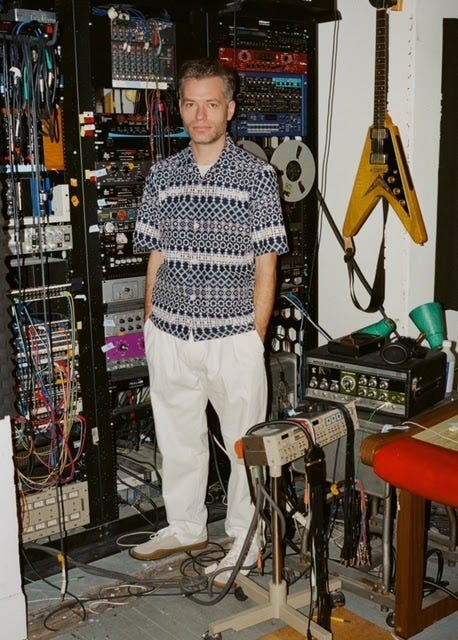
Dark night of the soul.
(laughs). Totally. Those sappy late 20s, early 30s. I think I was in my early 30s when I did that one. I had just been living in LA for a couple years, and it kind of felt like I was living the ‘life of Riley’ a little bit. Just… chillin’. But also not really pushing towards anything. And then I came to Vancouver because my visa expired and yadda yadda. And I was just kind of a blob. So those Who Cares? songs came out of the ‘blob period’ really quickly. And I recorded them really quickly, and put it out shortly after that while On Sunset was still getting tied up.
On Cahuenga was an idea from Owen [Ashworth of Advance Base, formerly of Casiotone for the Painfully Alone] from when we went on tour. He’d heard the recorded versions, then I was playing those songs on his Rhodes piano while on tour. He was like, “I love this—can you record it and I’ll put it out?” So… I did! I guess The Hills was me looking at the leftovers I had from those sessions on my hard drive and thinking, “This could also be something interesting,” and pulling that together.
It did finally come out though, this whole LA trilogy, and then you left LA. In your time there, do you feel like you found that classic, technicolor “LA” you’d been imagining? Were there still fragments of it there, or did you fall in love with a different side of LA that you discovered while living there?
I would say that because I’d experienced that childhood version, that was still in me. So I saw things through that child view, but I definitely slipped into a different LA that I had no idea about. And that included meeting tons of friends and participating in a life there. So I think both things happened.
Do you have any fun stories or moments that encapsulate what that time was like?
Well… up here, in Vancouver, what I’m used to on a social level is that there’s a bit of an icy distance between people. I was really into how I felt like I really slipped into a robust social scene in a natural way, which was so jarring and fun. And not in a wild party kind of way, but stuff just felt like it was happening all the time, and somehow I ended up being at these things that were happening. And I participated in it all with a kind of curiosity and excitement that felt good. I had friends there already and those relationships deepened, and then a bunch of new ones formed. So it was just a very cozy, special time. And then there’s always just the ridiculous things sprinkled on top of it, where you’re walking down to meet a friend around the corner and Howard Stern’s there in his car, or you’re at a friend-of-a-friend’s birthday party in Flea’s [bassist of the Red Hot Chili Peppers] place in Malibu or something (laughter). It was just funny. Funny times.
So beyond working with Phil and Owen, you have this history of being a part of a lot of different collaborations from all different angles, ranging from your early bands and projects like Gigi to working with Amber Coffman, Nite Jewel, and other folks. How does that history of collaboration contrast to your songwriting role on the new album with Joseph [Shabason] and Chris [Harris]?
I guess the main thing would be that with Gigi, those were all my songs and then everyone could make up their own parts, which made it very collaborative after the fact. But with Amber and Nite Jewel and Phil, whatever I was doing was in service of their vision and just trying to help, which was fun. But with this one it was very free, and it felt very much like a group, team effort. Everyone flipped into their natural roles. I guess after doing things for so long, people could play to their strengths or interests. And my role mainly ended up being the ‘singing person’ and the ‘words person.’
Was there a process for how you guys came to figure out the shape of the album? Was there a guiding idea there from the start?
Yeah! Joseph created a folder full of sketches over a year or two, and same with Chris, and I would tinker with them a little bit. And we ended up getting together at Joseph’s studio last December in Toronto. I didn’t have much prepared; I really trusted that it would just work. And I was so pleased that it did. I basically ended up coming up with most of the words and melodies on the spot while they were working on the tracks and we were just sitting in the room together. And there was such a real, implicit trust and understanding and love of one another that it felt like you could literally do whatever and it would be okay. And that felt like such a nice place to create from, you know? So it was never like, “Oh god they’re going to think this is stupid” (laughter). I was really happy to just not be in my head about anything.
First thought, best thought.
Yeah! It literally was that. They were just super encouraging when it came to recording. I was so happy with what I was hearing and what was going on. It happened very, very naturally and easily, which is not always the case.
So coming back to this concept of ‘place’ in songwriting, what’s in the title of the record for you, Philadelphia?
It was kind of random. Joseph had the idea to cover that Neil Young song from the Philadelphia soundtrack.
That cover is breathtakingly beautiful, by the way.
Thanks! Yeah that song is just… I love that song so much, and I have for years. Phil and I used to sometimes play it as part of my set, probably back in ’09. And I also had a long obsession with the Bruce Springsteen song from that soundtrack also, “Streets of Philadelphia.” This is a total tangent, but I’m obsessed with the workhorse of “Streets of Philadelphia”—which is such a finely crafted, dialed-in song—and Neil Young’s song sounds like he literally, like, plumped down at the piano and came up with it in the time it takes to listen to it. It clearly seems “first thought, best thought,” whereas Bruce Springsteen’s seems like “ten billionth thought, best thought.” They both created something super powerful; they’re just so different.
But anyway, with “Philadelphia,” it’s corny, but I looked at that word and it just seemed like the title for the record. I liked the Ancient Greek connotations and I liked the brotherly love aspect, because that was kind of the vibe while we were making this. It was just very… bro zone.
(laughs) Bro zone. I love it.
Plus, I think it’s sometimes nice to just slap a name on it. There’s nothing worse than trying to name a band or name a thing, so if something just pops up and it seems to work and everyone else likes it you’ve just got to stick with it, I think.
Right. The opposite of the 13-year-olds’ band that sits around coming up with logos and ten different names that they vote on before they’ve had their first rehearsal.
There’s a Kids in the Hall sketch about that. It’s so deep. And I’ve definitely done that. A lot.
That was me in my first death metal band, for sure.
(laughs) Did you actually play in a death metal band?
(laughter) I did! I did vocals and guitar… worlds away from the music I make now, but yeah.
Oh cool, awesome. What’s the music you work on now?
I don’t know if it would be your thing, but it’s sort of Morton Feldman by way of Lustmord with some Autechre and black metal in there.
Whoa. That sounds awesome!
But then the next thing is going to be Early Music like [Guillaume de] Machaut but done in a dungeon synth style (laughs).
That sounds amazing! Have you heard—it’s not Machaut done in a dungeon synth style—but have you heard that Burzum record, Dauði Baldrs?
Yea, my girlfriend and I were just listening to Burzum last night (laughter). I can’t say I’m the biggest fan compared to all the other stuff out there but when dude nails it he nails it.
Yeah, that MIDI one is the only one I know very well because I just like the palette of it; it’s hilarious.
Bizarrely—and I don’t mean to keep coming back to Phil—but one of my very favorite Mount Eerie albums is Eleven Old Songs, where he takes these sparse songs he wrote in Norway and does them, seemingly, as one-takes on this little Casio keyboard and it’s just… brilliant. It’s so full of feeling.
Yeah, I love that one too.
So maybe there’s a little bit of that in this upcoming one, too.
Totally; that’s so cool. What were we talking about?
Yeah, let’s come back to your music (laughter). The record starts out with “Osouji,” which on a simple level could be described simply as the act of a big, end-of-year deep cleaning. But as with many such Japanese concepts, the term has a much deeper cultural resonance to it as well. On your last album one of the most beautifully painful images centers around this sweet gift of “two sachets of hinoki wood” for a relaxing bath that never makes it to its intended recipient. Is there something particular about these sorts of poignant Japanese cultural fragments that resonates with you?
I’ve toured there a few times, and the concept of “osouji” was brought to my attention by my friend that’s from Japan but lives here. And I had no idea that that’s what I was doing by doing a literal deep clean at the end of the year, but she said, “Oh! This is what we call…” etc. So it was very random; I learned about it on the spot. And the hinoki thing… I like the way it smells, I like the way the tree looks (laughs). I think I maybe have an affinity for a lot of Japanese aesthetic things, but I’ve come upon it in roundabout ways. Also, when I’ve toured there, multiple times people have asked if I’m part Japanese. I don’t know why, but it comes up.
I don’t feel like I necessarily know that much about anything or fetishize anything or actively seek things out. But I think a lot of Japanese things on an aesthetic level and their practices just appeal to me naturally. And since I’ve basically just ended up singing about my boring life, these things work their way into the songs.
Are there any other things you might want to say about this new album, or thoughts you had about it?
I think whenever I do anything collaborative, for me, the joy of it is working on something with other people, where it’s not just me chasing my own vision, solely. That’s the thing that’s the most exciting to me, but I don’t know what that says about the work itself, really. I think the thing that interests me the most is just the energy behind what went into the songs. But saying this or that about the songs themselves… I don’t really know. I think maybe when it’s so new, too, you don’t really have enough perspective as to what to say or add at this point, unfortunately.
I would ask if you have any plans to tour, but of course we’re in this very bizarre world right now. So maybe another thing to ask instead is how are you dealing with all this? What does the ‘new normal’ look for you now?
Right. Well, I feel lucky in that I don’t get bored, and I’ve always been able to fill up idle time easily. So having lots of it kind of suits me well. Also at least in Vancouver it didn’t get so extreme that you couldn’t do anything. And especially since the weather here is fairly decent, I feel like I could be a lot worse off. And I feel really bad for people in other parts of the world where it’s just so harsh. So for me it’s been okay.
Yeah, south of the border here it’s a little more apocalyptic (laughs).
I know! On so many levels.
A lot of us are starting to think about escape plans (laughter).
Yeah, I mean, I would be too! It’s very cuckoo. And also as far as touring and stuff goes, years go by when you can tour where I just don’t. I really enjoy playing live, moreso in the last few years than ever. I enjoy singing and playing and sharing, but it’s not necessarily always been a full part of my day-to-day or even month-to-month.
So with that in mind, what’s on the horizon for you musically, or otherwise? What sorts of plans are you making, creatively, moving forward?
I’ve been working on a lot of different projects. I actually have a bit of a logjam of different recordings that are going to start to trickle out. So there’s this Philadelphia record, and then shortly after that… do you know Dear Nora?
Yeah, of course! I saw them [Katy Davidson] play a Key Losers set. And I noticed you have a fragment of their lyrics on the new album as well, right?
Yeah! We went down to LA together to play one show and then go to Disneyland together (laughter).
That’s so perfect.
We were on tour last summer and we were like, “Let’s go to Disneyland on our day off!!” And we were too zonked. So Katy was like, “This is what’s going on. We’re not going to Disneyland today. We’re going to relax, we’re going to reconvene in February, I’m going to book a show, we’re going to see Mickey Mouse.” (laughter). So we literally did that. But I also managed to get Zach and Greg in the band, and my friend Aaron [Olson] who has a band called L.A. Takedown. We went into the studio one day and recorded covers of friends’ songs. So we did two by this band LAKE…
Oh yea, I love LAKE!
Awesome! I love them so much too. And we did a Little Wings song, and a Chris Cohen song who we were on tour with back in the summer… so I have this little tape that’s coming out on this Phoenix label called Moone Records in October. So that was done in a day, really just for fun. And also, for the last year I’ve been recording at my house on my cassette 4-track which I hadn’t used in a billion years. So I’m trying to finish that thing up. It had collected dust, but for most of 2019 I was chipping away at this little hissing, recording thing.
Is that a Tascam?
Yeah! 424.
I’ve still got mine! Those things are workhorses.
I like those things. Have you used it recently?
I’ve been wanting to do another black metal thing, more like straight ahead, raw black metal, and of course 424 is as nice as you’d want it to be (laughter). Yeah, I love the 424.
Yeah, and it just felt nice trying to do something away from the computer for a change. I made “Ouch!” at home, and I think I have been realizing that that’s where I like to make things: as simply as I can, at home. So I was going to go even more hardcore, like, “I don’t have drums, but if I knock on this suitcase when I take all the stuff out of it it sounds like a kick.” I was just using stuff around the house. I like the way it sounds.
So that’s coming together, and then I had a quarantine project, like most people ended up doing. There’s this artist from Vancouver that I met when I was 15 years old named Veda Hille. She lives down the street from me and I’d been a fan of hers since I was a child, basically. Her music’s always been synonymous with springtime for some reason– like spring blossoms to me. So I was seeing them all come out, taking walks around the neighborhood, just for something to do, really. And I ended up putting all of her albums on my phone and listening to them and just thinking about me as a teenager, me as a 20 year old. And I thought, “I’m going to just record these, I’m going to pull a bunch of them together and make an album of her songs.” So I did that for the last four months. Joseph’s going to mix it and that’s going to come out, too. I’m excited about it. Just completely random stuff. So once that’s done then I’ll fully have a bit of a clean slate to actually start something completely new.
It never ends!
It feels that way! I’m thankful that I’ve gotten really good at—if I’m not in the mood to make something or write anything, I just don’t do it. I put zero pressure on myself to do anything.
That’s an important thing, I think, to learn as a songwriter, that you don’t owe anything to your songs. You don’t owe it to finish a bad song.
No! (laughter).
It’s good to just take a tape and throw it in the archives and maybe recycle an idea from it a few years later.
It’s been a while since I’ve even allowed there to be a little pile of unfinished, half-finished things. I just don’t do anything for sometimes a year or more, and just do other stuff. I feel like in those times away from writing you’re building the swirl of whatever’s going to come next, when it does, if it does.
The muse cannot be summoned at will…
Yeah, yeah. Though also at the same time, working on the thing with Joseph and Chris, I didn’t even think about ‘the muse’ or being inspired. I just trusted that it was going to be there and that I could access it at the time. And I don’t know if that was super egoic and crazy of me, but it seemed to work. That was a nice surprise. Because I didn’t really feel like I had anything to say, and I didn’t. I think I’m holding fast to this idea that just talking about real life in plain language is worthwhile, in some way. Just sharing, you know what I mean? Even if it’s something about just cleaning your apartment or whatever.
It’s one of those things where to some degree, counterintuitively, the more of these really specific details you put into a song, the more a person can relate to it. Like, I’ve never been to the Lido [referenced in Krgovich’s song of the same name], but when you sing about it in that song it feels so real, and it feels like moments I’ve had, in a way that it wouldn’t if you were just singing in very vague terms about, “Oh, I’m outside and I feel so bad.”
Yeah, totally. And I think I sang in vaguer or more fanciful terms for a long time because I felt so uncomfortable about sharing… anything. I’m so thankful that that dam has broken. And that’s seeped into my personal life, also.
Yeah? In what ways?
I don’t know; I think I was so uncomfortable with my sexuality and where I was at with everything for so long. Then all of a sudden it was like, “Oops!” Not in a nihilistic way, but just “This is stupid, who cares!” And ever since then things have been flowing a lot more naturally. It’s nice.
An ecstatic “who cares” instead of a blob “who cares.”
Yeah! Totally. Like an exclamation point at the end instead of a question mark (laughter).
I love that. Is there any question you always wish you'd been asked in an interview?
Hm. Nothing I can think of. I don’t do very many interviews, so whenever anybody, like on this occasion, is familiar with the stuff that I’ve made, that alone is enough of a treat. To just feel like I’m not screaming into a canyon. But… *pauses* yeah, no (laughter).
Okay! Just to end things on a lighter note then, what's for dinner tonight?
Ooh! We’re going to my parents’ house. Riley, my boyfriend, is vegan. My mom was very like… (in classic mom voice) “Is olive oil okay??” I’m like, “Mom, is olive oil derived from an animal?” She’s like, “No…” I’m like, “Then it’s fine!” (laughter). So she’s making some kind of mushroom pasta thing and a salad and… I think she made a rhubarb cake that has buttermilk in it, so we’re going to pick up some vegan ice cream for him or something. Simple Sunday dinner.
That sounds delicious.
Yep! What are you going to have?
Oh my goodness I hadn’t even thought about it!
And it’s later there! Isn’t it?
Yeah, it’s like 8pm.
So maybe popcorn?
Oh! I have leftover tacos from the other night.
Oh nice! What do you put in your tacos?
Let’s see… for these, I did a chipotle crema, some pickled onions, roasted poblanos…
Daaamn!
…and beef together with some southwest spices, and then just some lime on top.
That sounds great. The pickled onions especially. Pickled onions are really doing it for me these days. And it’s such a doable, easy thing.
Pickled anything, honestly.
Yea! I’m with you, 100%.
And the juice, too! I feel like throwing away the juice from any sort of pickling is sacrilege.
Illegal.
Illegal! It should be illegal (laughter). It’s the perfect base for a good cocktail.
Ooh, that’s an idea! I have some super artisanal pickle juice left over from this $17 jar of pickles we bought at the farmer’s market.
Try it with a good gin! Add a little citrus and you have a party.
Damn. That sounds good (laughter).
Buy Philadelphia at Bandcamp.
Thank you for reading the third issue of Tune Glue. Eat something delicious tonight.
If you appreciate what we do, please consider donating via Ko-fi. Tune Glue is dedicated to forever providing its content for free, but please know that all our writers are paid for the work they do. All donations will be used for paying writers, and if we get enough money, Tune Glue will be able to publish issues more frequently.



